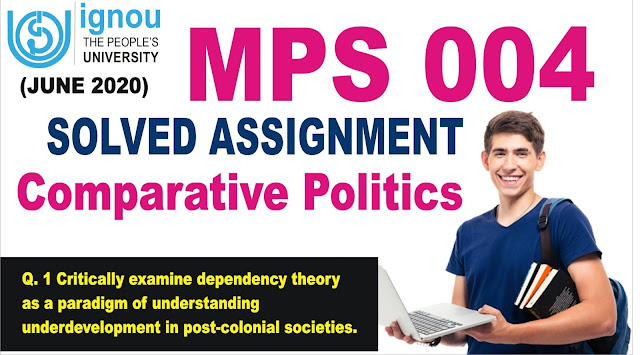Critically examine dependency theory as a paradigm of understanding underdevelopment in post-colonial societies.
Q.1. Critically examine dependency theory as a paradigm of understanding
underdevelopment in post-colonial societies.
Political Theory created in the late
1950s under the direction of the Director of the United Nations Economic
Commission for Latin America, Raul Prebisch. Prebisch and his associates were
pained by the way that monetary development in the progressed industrialized
nations didn't really prompt development in the less fortunate nations. Without
a doubt, their investigations recommended that financial action in the more
extravagant nations frequently prompted genuine monetary issues in the less
fortunate nations. Such a probability was not anticipated by neoclassical
hypothesis, which had expected that financial development was valuable to all
(Pareto ideal) regardless of whether the advantages were not in every case
similarly shared dependency theory as a paradigm of understanding
underdevelopment in post-colonial societies.
Prebisch's underlying clarification
for the marvel was clear: poor nations sent out essential items to the rich
nations who at that point fabricated items out of those products and sold them
back to the more unfortunate nations. The "Worth Added" by assembling
a usable item consistently cost more than the essential items used to make
those items. In this way, less fortunate nations could never be acquiring
enough from their fare income to pay for their imports.
Prebisch's answer was
comparatively direct:
less fortunate nations ought to set out on projects of import substitution with
the goal that they need not buy the fabricated items from the more extravagant
nations. The more unfortunate nations would in any case sell their essential
items on the world market, yet their outside trade stores would not be utilized
to buy their produces from abroad.
Three issues made this strategy
hard to follow. The
first is that the inside business sectors of the less fortunate nations were
not huge enough to help the economies of scale utilized by the more extravagant
nations to keep their costs low. The subsequent issue concerned the political
will of the less fortunate nations about whether a change from being essential
items makers was conceivable or attractive. Dependency theory as a
paradigm of understanding underdevelopment in post-colonial societies. The last issue rotated around the
degree to which the less fortunate nations really had control of their
essential items, especially in the territory of selling those items abroad.
These impediments to the import substitution strategy drove others to think
somewhat more imaginatively and truly at the connection among rich and poor
nations.
Now reliance hypothesis was seen as a
potential method for clarifying the diligent destitution of the less fortunate
nations. The conventional neoclassical methodology said for all intents and
purposes nothing on this inquiry but to declare that the more unfortunate
nations were late in coming to strong monetary practices and that when they
took in the systems of present day financial aspects, at that point the
neediness would start to die down. In any case, Marxists scholars saw the
tireless destitution as an outcome of entrepreneur abuse. What's more, another
assemblage of thought, called the world frameworks approach, contended that the
neediness was an immediate result of the advancement of the universal political
economy into a genuinely inflexible division of work which supported the rich
and punished poor people.
The discussions among the liberal
reformers (Prebisch), the Marxists (Andre Gunder Frank), and the world
frameworks scholars (Wallerstein) was energetic and mentally very testing. There are
still purposes of genuine differences among the different strains of reliance
scholars and it is a slip-up to believe that there is just one bound together hypothesis
of reliance. In any case, there are some center suggestions which appear to
underlie the investigations of most reliance scholars.
Dependency can be characterized as
a clarification of
the financial improvement of a state as far as the outer impacts - political,
monetary, and social - on national advancement strategies (Osvaldo Sunkel,
"National Development Policy and External Dependence in Latin
America," The Journal of Development Studies, Vol. 6, no. 1, October 1969,
p. 23). Theotonio Dos Santos stresses the recorded element of the reliance
connections in his definition:
[Dependency is]...an chronicled
condition which shapes a specific structure of the world economy with the end
goal that it supports a few nations to the inconvenience of others and limits
the improvement conceivable outcomes of the subordinate economics...a
circumstance in which the economy of a specific gathering of nations is adapted
by the advancement and extension of another economy, to which their very own is
oppressed.
(Theotonio Dos Santos, "The
Structure of Dependence," in K.T. Fann and Donald C. Hodges, eds.,
Readings in U.S. Colonialism. Boston: Porter Sargent, 1971, p. 226)
There are three normal highlights to
these definitions which most reliance scholars share. To start with, reliance
portrays the universal framework as contained two arrangements of states,
differently depicted as predominant/needy, focus/fringe or
metropolitan/satellite. The predominant states are the progressed industiral
countries in the Organization of Economic Co-activity and Development (OECD).
The reliant states are those conditions of Latin America, Asia, and Africa
which have low per capita GNPs and which depend intensely on the fare of a
solitary ware for remote trade income.
Second, the two definitions share for all intents and purpose
the supposition that outside powers are of solitary significance to the
monetary exercises inside the needy states. These outside powers incorporate
global enterprises, worldwide product markets, remote help, interchanges, and
some other methods by which the progressed industrialized nations can speak to
their monetary advantages abroad.
Third, the meanings of reliance all demonstrate that the relations
among prevailing and ward states are dynamic in light of the fact that the
collaborations between the two arrangements of states tend to fortify as well
as increase the inconsistent examples. Besides, reliance is an exceptionally
profound situated verifiable procedure, established in the internationalization
of free enterprise. Reliance is a progressing procedure:
Latin America is today, and has been
since the sixteenth century, some portion of a worldwide framework commanded by
the now-created nations.... Latin underdevelopment is the result of a specific
arrangement of connections to the universal framework.
Susanne Bodenheimer, "Reliance
and Imperialism: The Roots of Latin American Underdevelopment," in Fann
and Hodges, Readings, operation. cit., p. 157.
To put it plainly, reliance
hypothesis endeavors to clarify the present immature condition of numerous
countries on the planet by looking at the examples of collaborations among
countries and by contending that disparity among countries is an inherent piece
of those associations.
The Structural Context of Dependency: Is
it Capitalism or is it Power
Most reliance scholars see universal
free enterprise as the rationale power behind reliance connections. Andre
Gunder Frank, one of the most punctual reliance scholars, is very clear on this
point:
...verifiable research shows that
contemporary underdevelopment is in huge part the chronicled result of past and
proceeding eonomic and different relations between the satellite immature and
the now created metropolitan nations. Moreover, these relations are a basic
piece of the industrialist framework on a world scale all in all.
Andre Gunder Frank, "The
Development of Underdevelopment," in James D. Cockcroft, Andre Gunder
Frank, and Dale Johnson, eds., Dependence and Underdevelopment. Nursery City,
New York: Anchor Books, 1972, p. 3.
As indicated by this view, the
industrialist framework has authorized an unbending global division of work
which is liable for the underdevelopment of numerous regions of the world. The
needy states supply modest minerals, farming products, and modest work, and
furthermore fill in as the vaults of surplus capital, outdated advancements,
and made merchandise. These capacities arrange the economies of the reliant
states toward the outside: cash, merchandise, and administrations do stream
into subordinate states, yet the assignment of these assets are dictated by the
monetary premiums of the predominant states, and not by the financial premiums
of the needy state. This division of work is at last the clarification for
neediness and there is little inquiry yet that private enterprise sees the
division of work as a fundamental condition for the proficient portion of
assets. The most express appearance of this trademark is in the principle of
similar favorable position.
Additionally, to a huge degree the
reliance models rest upon the supposition that financial and political force
are vigorously moved and brought together in the industrialized nations, a
presumption imparted to Marxist speculations of dominion. In the event that
this supposition that is legitimate, at that point any differentiation among
monetary and political force is false: governments will make anything that
strides are important to secure private financial interests, for example, those
held by worldwide enterprises.
Not all reliance scholars, in any
case, are Marxist and one ought to obviously recognize reliance and a
hypothesis of colonialism. The Marxist hypothesis of government clarifies
prevailing state extension while the reliance hypothesis clarifies
underdevelopment. Expressed another way, Marxist hypotheses clarify the reasons
why dominion happens, while reliance speculations clarify the outcomes of
government. The thing that matters is huge. In numerous regards, colonialism
is, for a Marxist, some portion of the procedure by which the world is changed
and is accordingly a procedure which quickens the socialist unrest. Marx talked
favorably of British imperialism in India:
Britain needs to satisfy a twofold
strategic India: one dangerous, the other recovering - the obliteration of old
Asiatic culture, and the laying of the material establishments of Western
culture in Asia.
Karl Marx, "The Future Results
of the British Rule in India," New York Daily Tribune, No. 3840, August 8,
1853.
If You Want PDF
Whatsapp : 8130208920
Per Subject PDF 30/- Only






Post a Comment